Jim Sturgess has
been courting stardom for years.
First he turned
heads in the States with The Other Boleyn Girl. When that
film ended up only catching art house notice, he returned as the
star of the slick Hollywood formula film 21 with Kevin
Spacey. Then he showed off his musical chops with Julie Traymorís
surreal film Across the Universe with Evan Rachel Wood.
While all of those films got Sturgess raves, none quite broke him
through to stardom.
With his latest
film, the romantic comedy One Day with Anne Hathaway, stardom
may have finally found him.
Sturgess plays
Dexter, a well-off neíer-do-well who has a 20-some year friendship
with Hathawayís Emma, with like eventually maturing to love.
Sturgess and Hathaway have to check in with their characters every
year and show the changes and growth from university students to
confused young adults to minor celebrities to happy couple.
Recently,
Sturgess sat down with us at the Waldorf Astoria hotel in New York
to discuss One Day.
Anne was singing
your praises.
Oh, thatís nice.
I sing them back. Sheís lovely, too.
What was it like
acting with her?
It was great. It
was really interesting, watching the film yesterday; I realized how
many scenes we have apart. There was a whole part of her life that
I wasnít involved in, in the filming process. I just remember when
we were working on the film; it was really difficult, because we
were always in new time periods, with new parts of our lives. It
always felt like it was a new film we were making every day, but the
only one consistency was when I got to do a scene with Anne and we
got to be Emma and Dex together. So, I always looked forward to a
day when Anne was on set, we could be Emma and Dex. I really
enjoyed working with her. Sheís a really sweet, lovely girl.
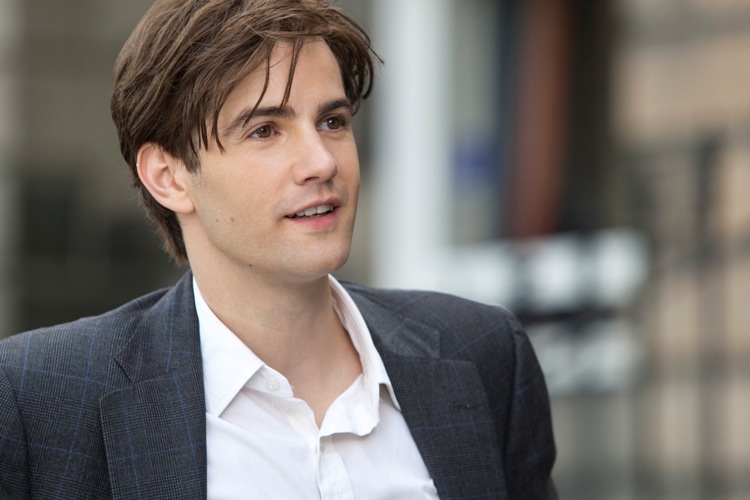 How would you
describe Dexter to somebody who didnít know anything about the
story? Also, in such a long arc, what were some of the constants you
could cling to?
How would you
describe Dexter to somebody who didnít know anything about the
story? Also, in such a long arc, what were some of the constants you
could cling to?
Heíd hard to
describe because he changes so much. Certainly at first, he comes
across as an over-privileged, underachieving, fun-loving,
irresponsible, mischievous kind of idiot, I suppose. And becomes
even more obnoxious and arrogant and vulgar, in a way, at times.
But then heís been making a lot of mistakes through his life and
heís learning through that. I genuinely think when I looked into it
that he is a really good person with a good heart Ė and a very good
friend to Emma. Thatís why she cares about him so much. Heís not
just simply annoying, arrogant and all that. Heís a very kind, very
loving friend who really wants the best for her. Heís a good
person, heís just pretty irresponsible. Likes to have a good time
and leaves a trail of destruction as he goes on.
Was the book a
help in keeping him sympathetic while showing his character where to
go?
Yeah, very much
so. He was trying to work out where does this arrogance come from?
It comes from insecurity. Often so. Why is he insecure? Where
does this come from? So, it was a case of treading the fine line Ė
I didnít want people to not like him. I didnít think that would
help the film and I know [director] Lone [Scherfig] talked to me
about that as well. I really wanted people to root for him and want
him to change and redeem himself and get better. Otherwise, you
would have just found him annoying and irritating. That wouldnít
have worked, because you really wanted to believe in their
friendship. Itís different in the book a little bit, because you
get to spend so much time with these people. In a film, you only
have two hours, really, so it was important that you got a sense of
that vulnerability quickly. That you didnít just hate him. Heís
just a kind of idiot, I suppose.
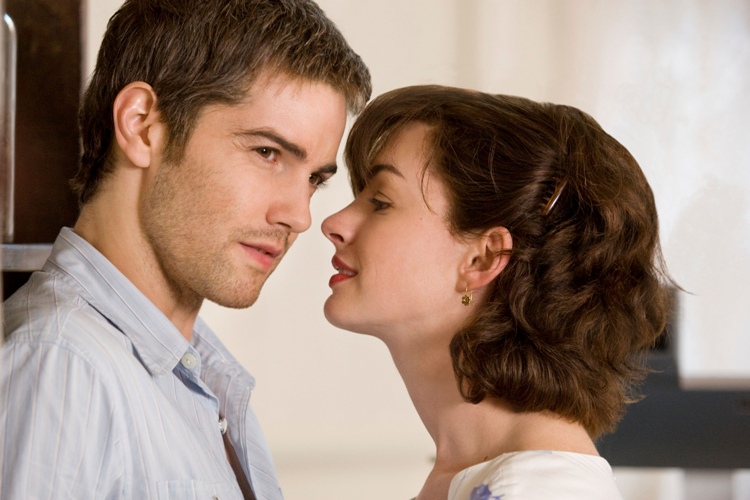 I asked Anne
this, and Iíd like to hear your take on it. Do you think that if
Emma and Dexter had hooked up in the beginning that their
relationship would have lasted as long as it did?
I asked Anne
this, and Iíd like to hear your take on it. Do you think that if
Emma and Dexter had hooked up in the beginning that their
relationship would have lasted as long as it did?
No, I really
donít. I think thatís the interesting thing about the film and
about relationships and about love and about fate. It had to happen
at that time. I think Dexter is even aware of that Ė he keeps her
very much at armís length. I believe if they got together any
sooner,
He would ultimately have cheated on her and he would have destroyed
any friendship and relationship they would have had. The friendship
is so important to him and the only thing he has in life of any
value, really. He holds onto that and pushes her away. There is
the interesting scene where they are skinny-dipping, and he has her
in the palm of his hands. She is right there. Sheís got no clothes
on. Thereís a beautiful sunset. Itís all there. She seems pretty
willing. And he says something really bizarre like, ďWell, the
problem is I fancy pretty much everybody.Ē It ruins the moment.
And then he offers the opportunity to have a fling. But at least he
gives her the opportunity. He doesnít whisper sweet things into her
ear to make something happen, because I think he knows that it is
going to hurt her.
There is
something about the 90s Dexter Ė that smarmy, coked-out thing Ė that
sort of reminded me of Patrick Bateman from
American Psycho.
(laughs)
RightÖ
But to a much
lesser degree. Was there any of that or what was your inspiration
for that version of Dexter?
Yeah, I mean you
are right, it is all those boys with their business cards and their
suits Ė and that was very much where he was at, hanging around the
bars of Soho. You see them when you live in London, you see those
people all the time, hanging around in swanky nightclubs and
restaurants. But for me, it was just so there in the writing in the
book. It was just who Dexter was and who he became. So my
influence was [that].
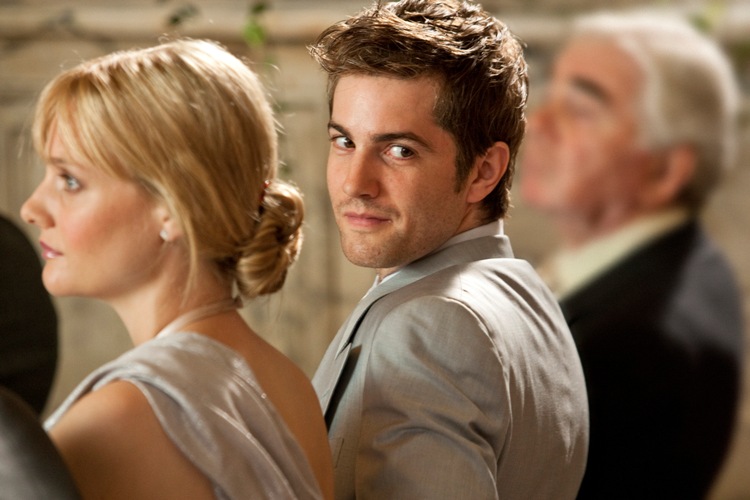 Lone mentioned you brought some physicality to the role she wasnít
expecting, especially with your hosting the TV show. How did the
host character come about for Dexter?
Lone mentioned you brought some physicality to the role she wasnít
expecting, especially with your hosting the TV show. How did the
host character come about for Dexter?
It just sort of came. Those shows were very much based on a show we
had in England at that time, a TV program called The Word
[with] Terry Christian, Amanda de Cadenet. We all grew up staying
up late watching those shows. I guess there were various TV
presenters I had stored in the back of my subconscious. The minute
I put on that outrageous suit, the scene just played itself out. We
had a lot of fun. We did a whole big improvised scene where they
made me interview this hip-hop band, like the Wu-Tang Clan. It was
just nuts. They used very little of it, thank God. Lone was just
saying, ďImprovise, interview the band.Ē So I ended up doing a rap
about a cheese sandwich. It was pretty funny.
Do you believe in
friendship? Do you think it can work between a man and a woman?
Yeah, I believe in friendship for sure. Life is pretty empty
without friends. I believe in friendships between men and women. I
have been thinking about it a lot, because a lot of people have been
asking me that question. My first answer is: of course men and
women can be friends. Of course they can.
Do you have many?
Loads of female friends. Loads and loads. Yeah. But then I really
started to think about it. I think men and women can be really good
friends. I donít know if they can be best friends, like these guys
are. I mean they are absolutely best friends. They are connected
in a way that they are not connected with anybody else. So, how do
you then have a relationship with somebody else if youíre that
connected to this very special person? So, maybe I now start to
think maybe a man and woman canít be best friends, but can be very,
very good friends. And, they obviously find each other attractive,
so itís going to become a problem. If youíre that close to someone
and you find them attractive, it would seem ridiculous not to
partner up.
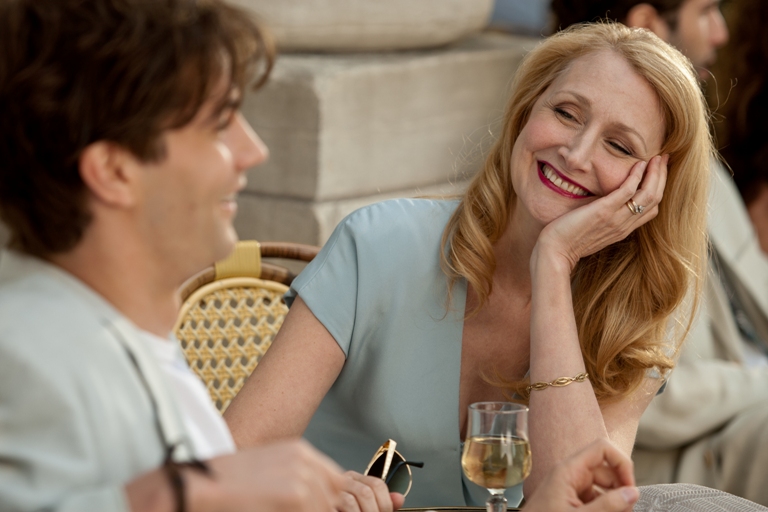 The screenplay was by a man, but the director was female. Did that
contribute to the little clash between the sexes in the film?
The screenplay was by a man, but the director was female. Did that
contribute to the little clash between the sexes in the film?
No, I donít think so at all. I donít think so. Whatís good about
it is you get two perspectives of the same thing. But I donít think
itís a perspective of a maleís perspective and a femaleís Ė itís
just this particular story. The story could have easily been some
weedy little posh guy with loads of money who is madly in love with
this crazy northern girl and she is the one cheating on him. Itís
not a male or female thing. Itís love. Itís relationships. Itís
the complications of love. Everybody has a different story. You
could follow two other people. In fact, you could make a story
about Emma and Ian [her longtime boyfriend early in the film, played
by Rafe Spall]. Emma would be the one who came up not so good.
People may not like Emma, because this poor, terrible comedian is
madly in love with this girl and she is not treating him right. So,
you just focus on these two people and I think thatís why people are
responding to the book and the story and the film Ė because every
story is different. Everyone can relate to that.
Did you read the book prior to playing for the part?
Yeah, sure, because it was the big research. It was the bible,
really. It had everything you needed to know. Thatís so rare.
Iíve never really made an adaptation like that before, where
everything you need to know is right in the pages of the book. So,
it was a really useful thing to have. It was so great that David
[Nicholls] wrote the script as well as the book. He was around. He
was a phone call away if you needed to check up on anything. It was
really helpful. But I didnít know the book before getting involved
in the film. Now I canít get away from the book. (laughs)
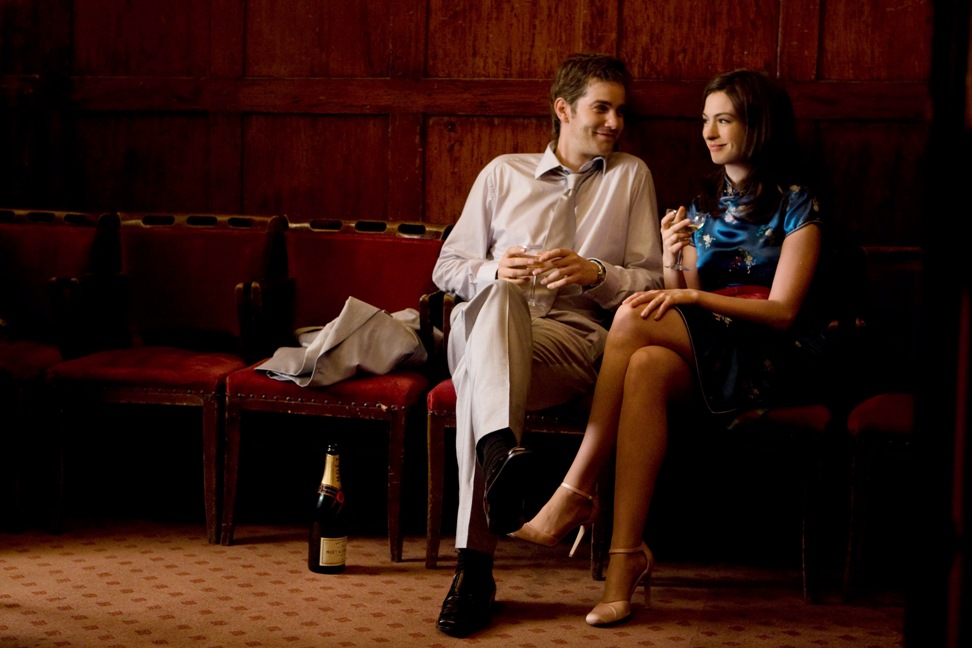 They go through highs and lows emotionally. Given that, what were
the most fun scenes to film?
They go through highs and lows emotionally. Given that, what were
the most fun scenes to film?
The most fun was definitely when we were in Dinard [France], which
was the holiday that they take. Iíd never shot a film or any scenes
where you had to pretend to be on holiday. (chuckles) It
was great. It was like: beautiful sunset on the beach, Iím in a
pair of swim shorts. ďWill you go and sunbathe over there and weíll
film you?Ē Fine by me. Iíll just sit here and you take your time.
Normally youíre on some lovely, exotic location, but they have you
dressed in some outrageous costume. Youíre sweating or youíve got a
fake beard on. This, Iím literally in a pair of swim shorts having
to come out of the ocean. That was pretty tough.
What qualities in Dexter did you relate to and which ones did you
find hardest to get a handle on?
There were things about Dexter that I related to and there were
things about him that were so far removed from what I feel my
personality is. Certainly, I think a lot of young people in general
Ė men and women Ė can relate to some of the mischievous stuff he
gets up to. Like just going out and having fun. Going to night
clubs. Experiencing life, really. Dexter, thatís what heís good
at. And I respect a lot of what he does. He makes very impulsive
decisions and he gets out there and has lots of fun Ė but that comes
with consequence. I related just as much to Emma as I did to
Dexter. People will. There is a lot of Emma in me and there is a
lot of Dexter in me, too. Iíve worked in a restaurant, washing pots
and pans. I remember getting promoted to salad boy and thinking my
life needs to change. (laughs) So I could relate to that.
Certainly the more insecure side of yourself is what Emma can
represent. Itís very easy to get stuck in a rut. Dexter just
throws himself out there and anything he doesnít enjoy, he wonít
think twice about it. Life is about living and enjoying and he just
gets out there. At the same time, itís very easy to get stuck in a
relationship you donít maybe want to be in, or in a house you donít
want to live in. Dexter has the fortunate, privileged background to
just use the world as his playground. For other people, itís not
always that simple.
CLICK HERE TO SEE WHAT JIM STURGESS HAD TO SAY
TO US IN 2008!
CLICK HERE TO SEE WHAT ANNE HATHAWAY HAD TO SAY
TO US ABOUT ONE DAY!